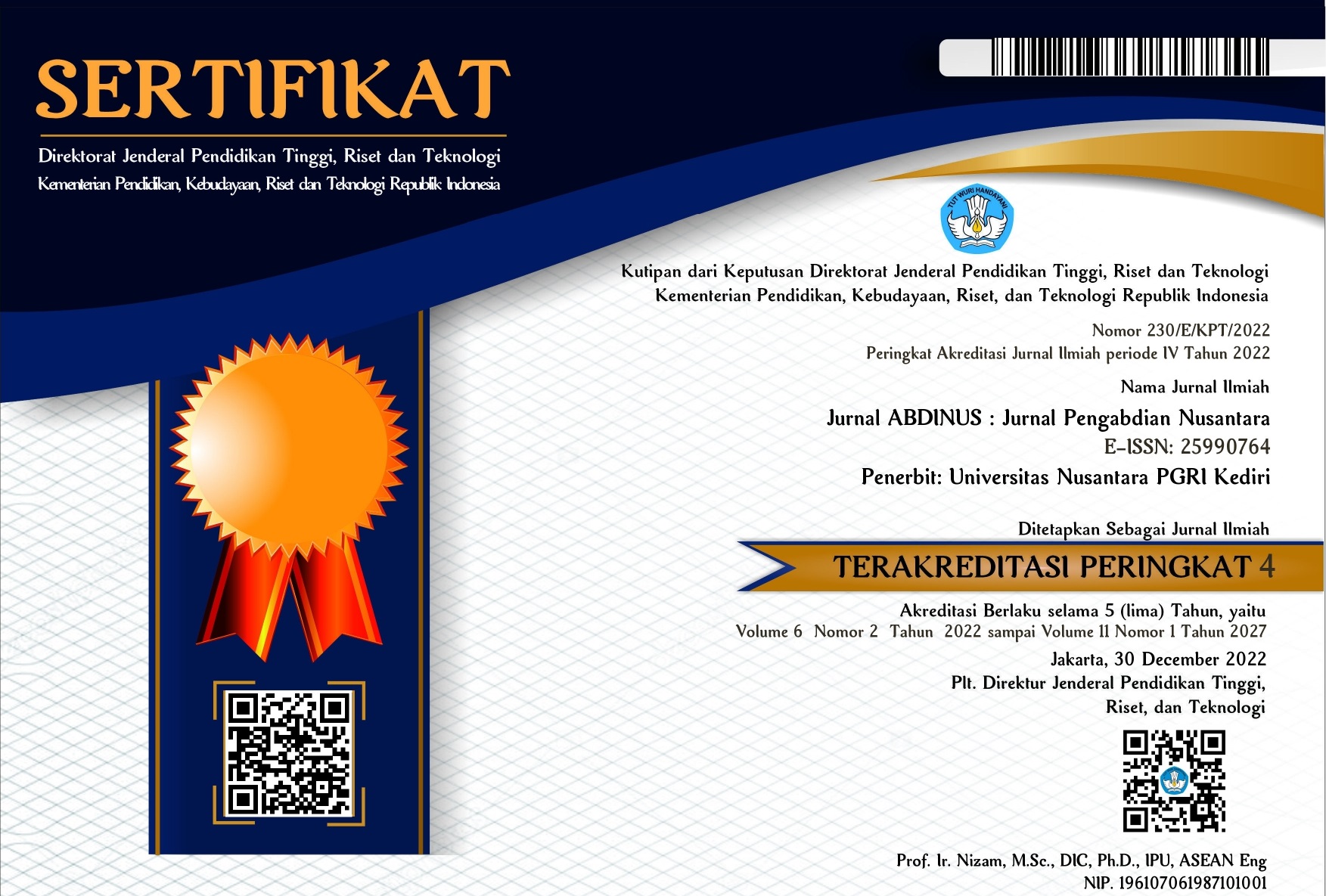Pelatihan Penggunaan Geogebra Classroom untuk Mengoptimalkan Pembelajaran Matematika
DOI:
https://doi.org/10.29407/ja.v4i2.15353Keywords:
GeoGebra, GeoGebra Classroom, Mathematics learning.Abstract
GeoGebra Classroom provides solutions for mathematics learners to design online mathematics lessons during the Covid-19 pandemic. The purpose of Community Service (PKM) is to provide mathematics learners with skills to use the GeoGebra Classroom to optimize online mathematics learning. This PKM activity uses an educational approach; that is, this activity has an element of education that can dynamize society towards educational goals. The method used is in the form of online training on the use of GeoGebra Classroom in designing virtual finishes. The training results show that there are positive benefits for this training, teacher motivation to design virtual classes, and teacher activeness in completing independent exercises after the first training session. The main obstacle experienced by participants during online training is the poor signal quality which reduces the quality of sound and video during the training. The results of this training provide skills in designing online mathematics lessons using the GeoGebra Classroom.
Downloads
References
Alhat, Swapnil. 2020. “Virtual Classroom: A Future of Education Post-COVID-19.” Shanlax International Journal of Education 8(4):101–4. doi: 10.34293/education.v8i4.3238.
Alkhateeb, Mohammad Ahmad, and Ahmed Mohammad Al-Duwairi. 2019. “The Effect of Using Mobile Applications (GeoGebra and Sketchpad) on the Students’ Achievement.” International Electronic Journal of Mathematics Education 14(3):523–33. doi: 10.29333/iejme/5754.
Arbain, Nazihatulhasanah, and Nurbiha A. Shukor. 2015. “The Effects of GeoGebra on Students Achievement.” Procedia - Social and Behavioral Sciences 172(2007):208–14. doi: 10.1016/j.sbspro.2015.01.356.
Bu, Lingguo, and Robert Schoen. 2011. Model-Centred Learning Pathways to :Mathematical Understanding Using GeoGebra. Vol. 1. edited by J. M. Spector, N. M. Seel, and K. Morgan. Rotterdam: Sense Publishers.
Dockendorff, Monika, and Horacio Solar. 2017. “ICT Integration in Mathematics Initial Teacher Training and Its Impact on Visualization: The Case of GeoGebra.” International Journal of Mathematical Education in Science and Technology 49(1):66–84. doi: 10.1080/0020739X.2017.1341060.
Habinuddin, Endang, Euis Sartika, Anny Suryani, Sri Murniati, and Agus Binarto. 2016. “Peningkatan Keterampilan Penggunaan Software Guru Smp Cimahi the Skill Improvement of Using Geogebra Software in Mathematics Learning for Junior High School ( Smp ) Teachers in Cimahi.” Sigma-Mu 8(1):7–16.
Ibrahim, Kepceoğlu, and Yavuz llyas. 2016. “Teaching a Concept with GeoGebra: Periodicity of Trigonometric Functions*.” Educational Research and Reviews 11(8):573–81. doi: 10.5897/err2016.2701.
Kul, Umit. 2012. “Turkish Mathematics Teachers’ Experiences with Geogebra Activities: Changes in Beliefs.” Research in Mathematics Education 14(3):293–94. doi: 10.1080/14794802.2012.734984.
Ljajko, Eugen, and Vait Ibro. 2013. “Development of Ideas in a GeoGebra – Aided Mathematics Instruction.” Mevlana International Journal of Education 3(3):1–7. doi: 10.13054/mije.si.2013.01.
Molnár, Pavel. 2016. “Solving a Linear Optimization Word Problems by Using GeoGebra.” International Journal of Information and Communication Technologies in Education 5(2):16–28. doi: 10.1515/ijicte-2016-0006.
Mthethwa, Mthembeni, Anass Bayaga, Michael J. Bossé, and Derek Williams. 2020. “Geogebra for Learning and Teaching: A Parallel Investigation.” South African Journal of Education 40(2):1–12. doi: 10.15700/saje.v40n2a1669.
Naufal Ishartono, Ilham Ahmad Alfian, Nurul Firdaus. 2016. “Pelatihan Penggunaan Software Geogebra Pada Materi Bangun Ruang Dimensi Tiga Untuk Guru-Guru Matematika Sekolah Menengah Muhammadiyah Se-Sukoharjo.” The 4th University Research Coloquium 2016 (April):264–70.
Nisiyatussani, Vidya Ayuningtyas, Maman Fathurrohman, and Nurul Anriani. 2018. “GeoGebra Applets Design and Development for Junior High School Students to Learn Quadrilateral Mathematics Concepts.” Journal on Mathematics Education 9(1):27–40.
Onaifoh, N. M., and C. O. Ekwueme. 2017. “Innovative Strategies on Teaching Plane Geometry Using Geogebra Software in Secondary Schools in Delta State.” Global Journal of Educational Research 16(1):56. doi: 10.4314/gjedr.v16i1.8.
Poon, Kin Keung. 2018. “Learning Fraction Comparison by Using a Dynamic Mathematics Software–GeoGebra.” International Journal of Mathematical Education in Science and Technology 49(3):469–79. doi: 10.1080/0020739X.2017.1404649.
Priwantoro, Soffi Widyanesti, Syariful Fahmi, and Dian Ariesta Y. 2019. “Pelatihan Peningkatan Kemampuan It Bagi Guru Matematika Menggunakan Geogebra.” Jurnal Terapan Abdimas 4(2):203. doi: 10.25273/jta.v4i2.4847.
Richardson, Sue Ellen, and Melike Yigit Koyunkaya. 2017. “Fostering Students ’ Development of the Concept of Angles Using Technology.” Apmc 22(1):13–20.
Tatar, Enver, and Yılmaz Zengin. 2016. “Conceptual Understanding of Definite Integral with GeoGebra.” Computers in the Schools 33(2):120–32. doi: 10.1080/07380569.2016.1177480.
Zengin, Yılmaz. 2017. “The Effects of GeoGebra Software on Pre-Service Mathematics Teachers’ Attitudes and Views toward Proof and Proving.” International Journal of Mathematical Education in Science and Technology 48(7):1002–22.
Zulnaidi, Hutkemri, and Sharifah Norul Akmar Syed Zamri. 2017. “The Effectiveness of the Geogebra Software: The Intermediary Role of Procedural Knowledge on Students’ Conceptual Knowledge and Their Achievement in Mathematics.” Eurasia Journal of Mathematics, Science and Technology Education 13(6):2155–80. doi: 10.12973/eurasia.2017.01219a.















